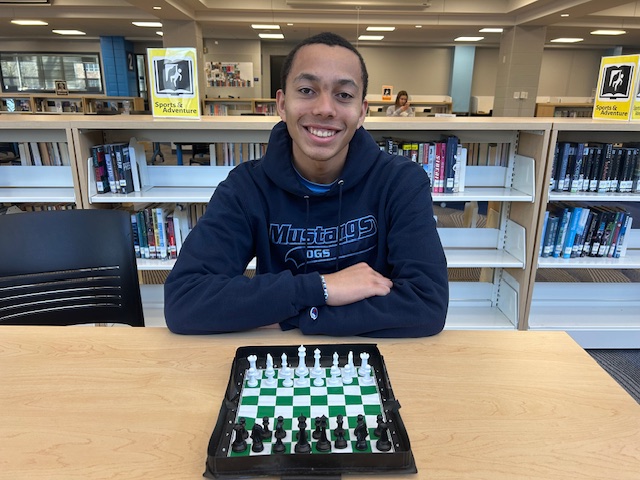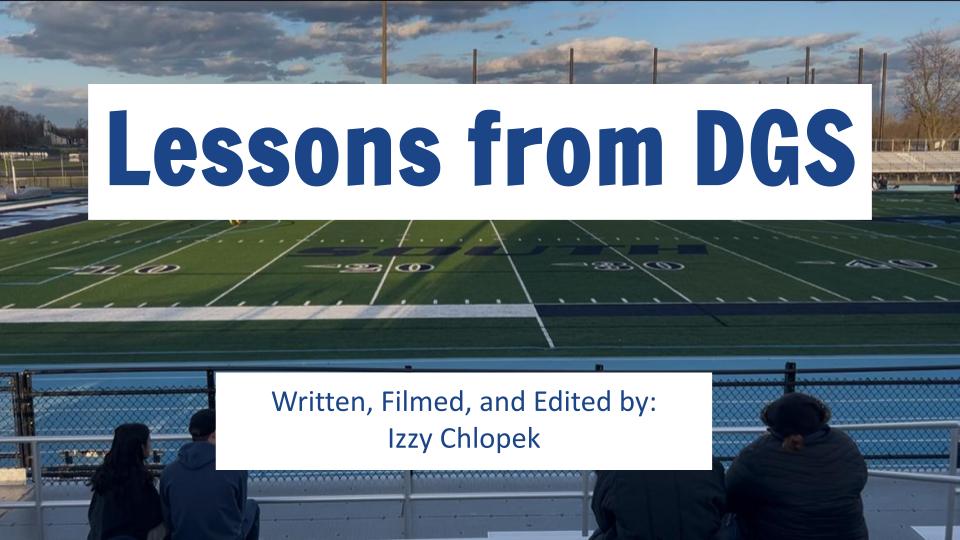Think, move, think, move, pivot, think, move, adjust: all thoughts of a chess player. Thinking on the fly is sophomore Jonathan Robinson’s specialty. As a member of the DGS chess team, it is his responsibility to make quick decisions, think ahead and get into his opponent’s mind to bring home a victory.
Robinson recently went undefeated playing board one, the most advanced player on the team, at the Bolingbrook Raiders tournament. He is typically board two but often steps up to fill in board one on multiple occasions. Robinson took a moment to reflect on his chess journey so far and what it might hold in the future.
“Well I won’t be stepping up to board one if Raul is there; on the rare occasions he wasn’t there, I did have to step up to board one. I was a little more nervous at tournaments; however, the nerves disappear after the first game usually,” Robinson said.
Like many sports and activities, chess brings its own unique collection of mental challenges. Robinson speaks to the insights he’s taken away from them.
“Patience, if you’re playing an in-person game and even if I am ready to make my next move my opponent might not be, and you have to just sit there quietly at the board and wait. Also, pressure, thinking under pressure because you’re under a time limit can be a bit stressful,” Robinson said.
Senior Chris Tung is Board 16 and a teammate to Robinson on the chess team. Tung has worked closely with Robinson, seeing how he deals with challenges.
“The time aspect can be challenging; games can last up to two hours so it gets boring after a while but you just have to lock in. [Jonathan] plays pretty quickly so he sometimes makes more mistakes than not but usually he’s fine in the end,” Tung said.
Chess team coach Frank Ding has coached Robinson for two years, speaking to how he’s seen improvement in his board two.
“Because he’s better than me, I can’t really gauge his improvement. I’ve played against him a couple times this year, and I’m always on the losing end; the only real way to gauge is by how quickly he can beat me, how long I can survive basically. He got substantially faster this year,” Ding said.
Robinson is in complete control of his chess journey, taking it upon himself to help others when he can.
“He practices quite a bit, always shows up to practice, always tries new things like opening and always has something new to bring to the rest of us. He teaches strategies to lower and even higher boards; he sits down and goes over specific move order and patterns,” Tung said.
Robinson is one of those hard working students with a busy schedule, participating in track and field, the fine arts programs and an out-of-school theater production. Despite this, he still finds time to practice and learn.
“Honestly just play games online because it’s hard to practice in-person since we have meetings Tuesdays and Thursdays, but I sometimes can’t go because of track so I usually practice online,” Robinson said.
Robinson has been practicing games for many years, starting chess a long time ago.
“A friend introduced it to me in elementary school. I think in first grade, I started playing consistently a year or two later. I stuck with it because I like that there’s a lot of different ways to figure out a way to win, and there’s also a lot of different ways to play. It’s fun to figure out each individual way,” Robinson said.
With many things going on in his life, Robinson would prefer to focus on the fun side of chess.
“I’d say competitively I probably won’t play it in college because I don’t know the level of intensity, I think I’ll play it as a hobby,” Robinson said.






![In this documentary, you will learn how violins are made. All music is in the public domain:
Music Produced by Deutsche Grammophon, Medici TV, Heifetz Institute, and Queen Elisabeth competition
Paganini, Caprice No. 24 [Song recorded by Jasha Heifetz]. Heifetz Institute. (Original work published 1817)
Paganini, Caprice No. 24 [Song recorded by Jasha Heifetz]. Heifetz Institute. (Original work published 1817)
Bartok, Sonata No.1 for Solo Violin [Song recorded by Kevin Zhu]. Queen Elizabeth Competition. (Original work published 1944)
Paganini, Violin Concerto no. 1 [Song recorded by Philippe Hirshhorn]. Queen Elizabeth Competition. (Original work published 1819-1825)](https://southblueprint.com/wp-content/uploads/2025/05/Screenshot-2025-05-07-122429-1200x668.png)






